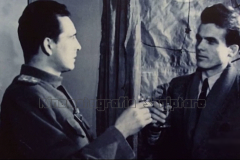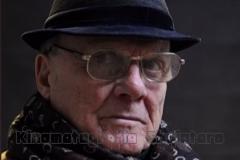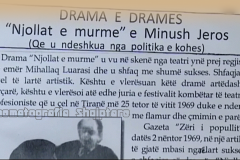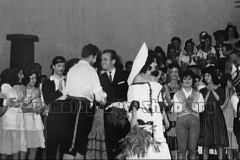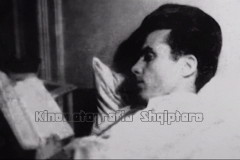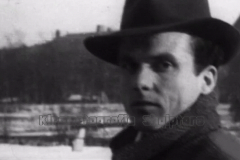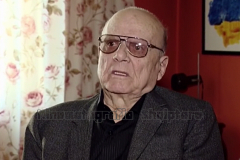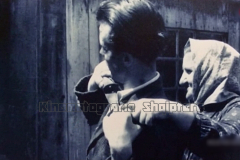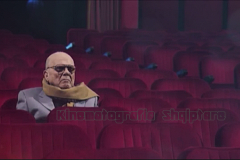Mihal Luarasi (1929-2017)
Outstanding director of the Albanian Theater!
He was born on September 16, 1929 in Korça. Luarasi completed high school at the artistic high school “Jordan Misja” in Tirana, while his higher studies at the Academy of Theater and Film Arts in Budapest, Hungary. In the theater for the first time as a director, he appeared with Schiller’s tragedy “Intrigue and love” in 1957 with great success at the “People’s Theatre”, a show that remained in the repertoire for seven years and was played more than 300 times.
 Mihal Luarasi is one of the three prominent directors of the brightest and best quality period of the Albanian theater in the years 1957-1973:
Mihal Luarasi is one of the three prominent directors of the brightest and best quality period of the Albanian theater in the years 1957-1973:
Luarasi – Spahivogli – Mani.
For reasons that are known, Luarasi performed few shows at the National Theater, but they were distinguished for their quality and high artistic level, such as: “Dragon of Dragobia”, “The Fox and the Grape” (winner of all the first prizes in the II Festival National Theatres), “White Age”, “Inhabitants of floor No. 6”, “Detours”, “Such a Love”.

In 1966, for the first time on stage at the “Migjeni” Theater in Shkodra, the drama “The Girl of the Montains” was performed. In 1973 he staged Tennessee Williams’ play “Orpheus Descent into Hell”, which was banned from general rehearsals. He is the director of the drama “Brown spots” by M. Jero with the troupe of Korça, with which he won all the first prizes at the 4th National Theater Festival in 1969.
 After three days, the communist leader Enver Hoxha saw the spectacle and condemned it as a hostile act.
After three days, the communist leader Enver Hoxha saw the spectacle and condemned it as a hostile act.
Luarasi worked in the “AZ Cajupi” Theater in Korce for five years and performed a series of unforgettable shows, such as “The invincible”, “After two years”, “Fire in the house”, etc.
In 1972, in the “A. Moisiu” Theater in Durrës, he staged the drama “The Case of Engineer Saimir” by Fadil Paçrami, a work that was condemned.
With the 11th festival in RTVSH 1972, Luarasi again encountered the system of time and the leader Enver Hoxha, who this time did not forgive him for his continuous “faults” and ordered his imprisonment. He was sentenced to eight years in prison.
After his release, he worked as a painter until 1990. In December 1990, he left for Hungary. In 1991-1992, he staged Rexhep Qosje’s drama “Death of a Queen” in Budapest.
In 1995, he was invited by the National Theater in Tirana and staged the drama “Iron Bars” by the Hungarian playwright Göncz Arpad. Mihal Luarasi is the director of several big shows at the Theater of Opera and Ballet, such as “Carmen”, “La traviata”, “Spring”, “Opera for three “grosh”, etc. During his stay in Hungary, he published a series of articles on theater in the Hungarian and Albanian press.
In 2003, his book “National Theater at the Crossroads” was published, and two years later, the second book with writings on theater and other arts, “Memory that doesn’t sleep”.
 In 2001, Luarasi wrote the drama “Speedboat” which was staged in TK, in 2003, by the director Gezim Kame. In this year he finally returns from Hungary. He staged Ruzhdi Pulaha’s drama “Shelter of the Forgotten” in TK on the 60th anniversary of the National Theatre. In 2006, he wrote and staged the drama “Korbi bardhe” which continues to be shown successfully (2007).
In 2001, Luarasi wrote the drama “Speedboat” which was staged in TK, in 2003, by the director Gezim Kame. In this year he finally returns from Hungary. He staged Ruzhdi Pulaha’s drama “Shelter of the Forgotten” in TK on the 60th anniversary of the National Theatre. In 2006, he wrote and staged the drama “Korbi bardhe” which continues to be shown successfully (2007).
Luarasi passed away on October 30, 2017.
_____________
Albanian Cinematography in activity since 2013
Follow us: Blog: https://albaniancinematography.blogspot.com/ Vimeo: Albanian Cinematography (vimeo.com) Facebook: https://www.facebook.com/ksh.faqjazyrtare Dailymotion: https://www.dailymotion.com/kinetografiashqiptareartisporti YouTube: https://www.youtube.com/channel/UCDRYQ5xCyGkfELm3mX8Rhtw
Discover more from Albanian Cinematography - Sport
Subscribe to get the latest posts sent to your email.

